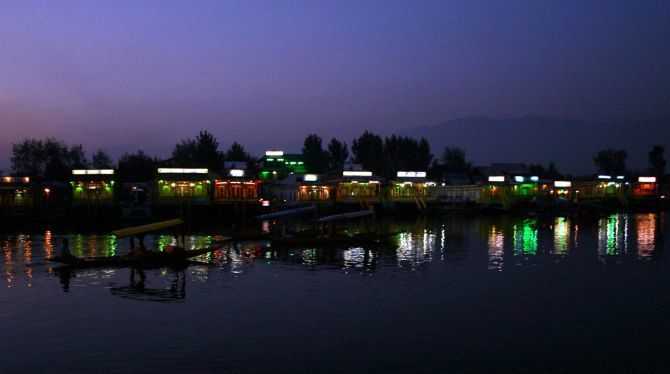
A boy paddles his boat on a polluted Dal Lake. Photograph: Umar Ganie
Jammu and Kashmir Chief Minister Mufti Mohammad Sayeed on Tuesday directed the Lakes and Waterways Development Authority to immediately undertake realignment of houseboats in the famous Dal Lake to prevent influx of untreated sewage from entering into the water body.
The chief minister ordered the realignment of 388 houseboats at Doldum to prevent the influx of untreated sewage into the lake.
Mufti issued the directions while chairing a high-level meeting to review the progress achieved under the National Lake Conservation and Management Programme, a Rs 298 crore project sanctioned by the ministry of environment and forest for the lake’s preservation.

A Kashmiri fisherman throws a net into the waters of Dal Lake. Photograph: Umar Ganie
“Unless houseboats realign, a common sewage treatment plant cannot be installed. With untreated sewage and refuse directly entering the lake, the enriched nutrient content will hasten uncontrolled growth of weeds in the lake,” he told the meeting.
The chief minister directed the LAWDA and the tourism department to strictly implement the plan as it is critical to maintaining the lake.
Making the regular cleaning and monitoring of the lake a top priority, Mufti noted with concern the extremely slow pace of de-weeding, which has given the water-body a very scruffy look, an official statement said.

A boat returns to the lakeshore after completing the de-weeding process. Photograph: Umar Ganie
He asked the vice chairman of LAWDA to reinforce all resources at his disposal in cleaning up the lake waters over the course of the next two months.
“Manual de-weeding of the lake has to be a continuous process and needs to be prioritised,” the chief minister said.

A shikara rows pass house boats at Dal Lake. Photograph: Umar Ganie
On the issue of LAWDA being deficient in lake-cleaning machines, given the huge expanse of the lake, the chief minister gave approval to the purchase of new machines to expedite the de-weeding processes.
The chief minister also directed the inspector general of police, Kashmir zone, to provide adequate manpower to the enforcement wing of LAWDA so that a proper night vigil is maintained over illegal constructions in and around the Lake.

Government labourers pictured as they clean the lake. Photograph: Umar Ganie
The vice chairman of LAWDA informed the chief minister that presently five STPs of 38.7 MLD-capacity have been commissioned with more than 150 km of sewer infrastructure laid along with house connectivity.
He said while two STPs are state-of-the-art, the remaining three based on outdated technology and need to be upgraded for better nutrient removal.

An image of several houseboats afloat in the middle of the lake. Photograph: Umar Ganie
“September is the worst month when weeds are in full bloom. However, because of constant flushing, there has been no red algae in the lake this year,” the vice chairman informed the chief minister.
Dispelling misperceptions about the actual expanse of the lake, the vice chairman said the total area of the Dal Lake, as per satellite imaging, is 20.21 sq km.

People row their boats towards the shore after a session of de-weeding. Photograph: Umar Ganie
Sir Walter Lawrence, in 1895, had recorded the lake expanse at 25.86 km.
Asking LAWDA to conceive Rakh-e-Arth as a modern city centre with facilities of developed roads, power, potable water, school and banking, the chief minister asked the housing and urban development department to provide adequate funds to LAWDA so that Dal dwellers are shifted to the new colony, which is a precursor to effective implementation of the lake conservation project.

Tourists enjoy pleasant rides on the shikara. Photograph: Umar Ganie
“We also need to provide alternate means of livelihood to persons who will be shifted out of the lake,” he said.
“In all, nearly 10,000 families from 58 hamlets inside the lake will be shifted to Rakh-e-Arth colony at Bemina and other colonies maintained by LAWDA. Out of 10,600 plots to be developed in a phase-wise manner, 1,729 have already been developed and another 400 plots will be ready shortly,” the statement said.
“LAWDA has already released funds to power and public health engineering departments for creation of utilities so that around 700 families which have shifted to Rakh-e-Arth have access to basic amenities,” the statement added.





